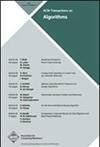渐近良好量子编码的有效解码可达编码长度的恒定分数
IF 1.4
3区 计算机科学
Q3 COMPUTER SCIENCE, THEORY & METHODS
引用次数: 0
摘要
我们介绍并分析了一种高效的量子坦纳编码解码器,它可以纠正线性权重的对抗性错误。之前的量子低密度奇偶校验码解码器只能处理权重为 \(O(\sqrt{n\log n})\) 的对抗性错误。我们还研究了量子坦纳码与潘捷列夫和卡拉切夫的举积码之间的联系,并证明我们的解码器可以适用于后者。解码算法交替使用顺序和并行程序,并在线性时间内收敛。本文章由计算机程序翻译,如有差异,请以英文原文为准。
Efficient decoding up to a constant fraction of the code length for asymptotically good quantum codes
We introduce and analyse an efficient decoder for quantum Tanner codes that can correct adversarial errors of linear weight. Previous decoders for quantum low-density parity-check codes could only handle adversarial errors of weight \(O(\sqrt{n\log n})\). We also work on the link between quantum Tanner codes and the Lifted Product codes of Panteleev and Kalachev, and show that our decoder can be adapted to the latter. The decoding algorithm alternates between sequential and parallel procedures and converges in linear time.
求助全文
通过发布文献求助,成功后即可免费获取论文全文。
去求助
来源期刊

ACM Transactions on Algorithms
COMPUTER SCIENCE, THEORY & METHODS-MATHEMATICS, APPLIED
CiteScore
3.30
自引率
0.00%
发文量
50
审稿时长
6-12 weeks
期刊介绍:
ACM Transactions on Algorithms welcomes submissions of original research of the highest quality dealing with algorithms that are inherently discrete and finite, and having mathematical content in a natural way, either in the objective or in the analysis. Most welcome are new algorithms and data structures, new and improved analyses, and complexity results. Specific areas of computation covered by the journal include
combinatorial searches and objects;
counting;
discrete optimization and approximation;
randomization and quantum computation;
parallel and distributed computation;
algorithms for
graphs,
geometry,
arithmetic,
number theory,
strings;
on-line analysis;
cryptography;
coding;
data compression;
learning algorithms;
methods of algorithmic analysis;
discrete algorithms for application areas such as
biology,
economics,
game theory,
communication,
computer systems and architecture,
hardware design,
scientific computing
 求助内容:
求助内容: 应助结果提醒方式:
应助结果提醒方式:


